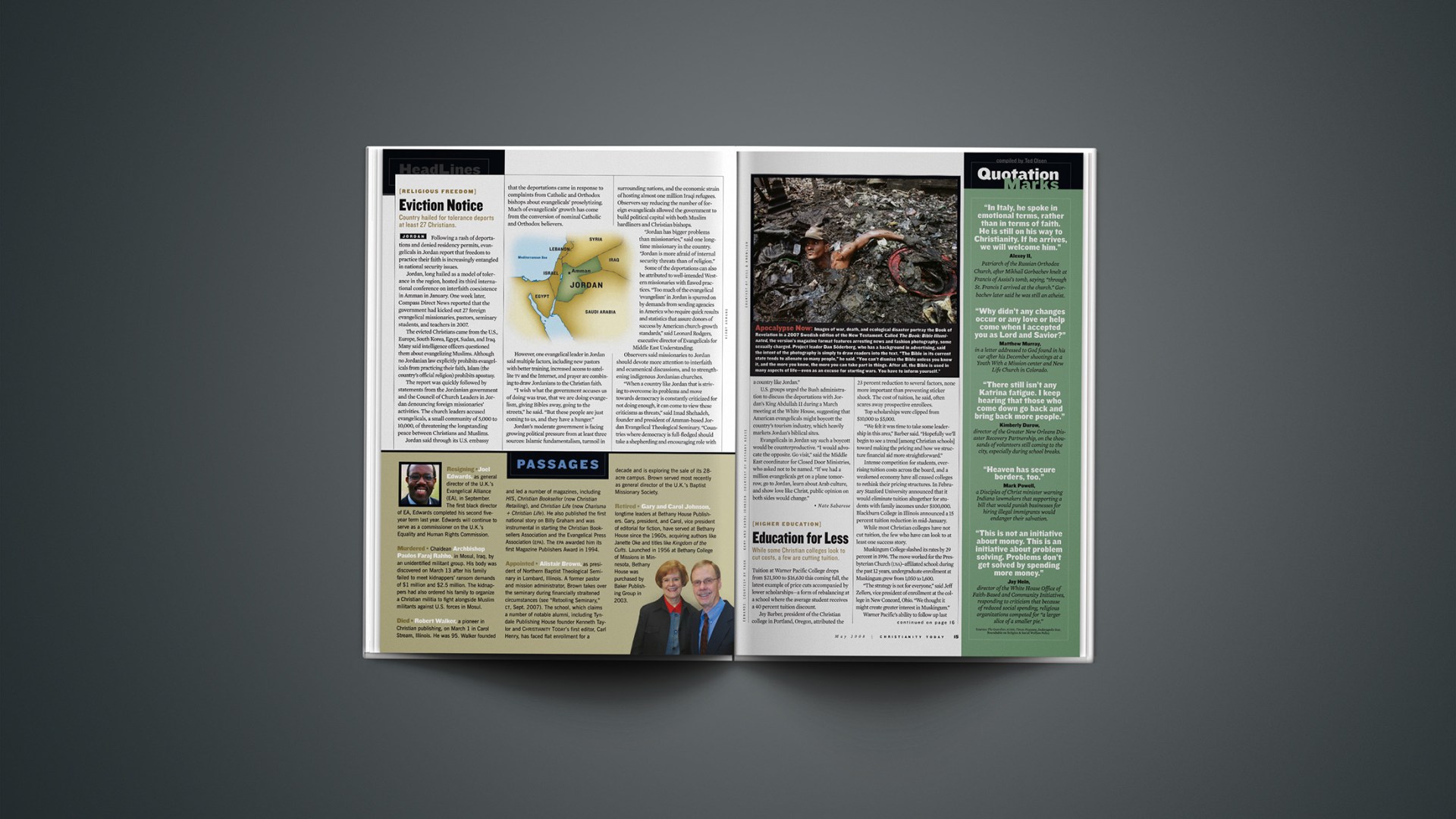Following a rash of deportations and denied residency permits, evangelicals in Jordan report that freedom to practice their faith is increasingly entangled with national security issues.
Jordan, long hailed as a model of tolerance in the region, hosted its third international conference on interfaith coexistence in Amman in January. One week later, Compass Direct News reported that the government had kicked out 27 foreign evangelical missionaries, pastors, seminary students, and teachers in 2007.
The evicted Christians came from the U.S., Europe, South Korea, Egypt, Sudan, and Iraq. Many said intelligence officers questioned them about evangelizing Muslims. Although no Jordanian law explicitly prohibits evangelicals from practicing their faith, Islam (the country’s official religion) prohibits apostasy.
The report was quickly followed by statements from the Jordanian government and the Council of Church Leaders in Jordan denouncing foreign missionaries’ activities. The church leaders accused evangelicals, a small community of 5,000 to 10,000, of threatening the longstanding peace between Christians and Muslims.
Jordan said through its U.S. embassy that the deportations came in response to complaints from Catholic and Orthodox bishops about evangelicals’ proselytizing. Much of evangelicals’ growth has come from the conversion of nominal Catholic and Orthodox believers.
However, one evangelical leader in Jordan said multiple factors, including new pastors with better training, increased access to satellite TV and the Internet, and prayer are combining to draw Jordanians to the Christian faith.
“I wish what the government accuses us of doing was true, that we are doing evangelism, giving Bibles away, going to the streets,” he said. “But these people are just coming to us, and they have a hunger.”
Jordan’s moderate government is facing growing political pressure from at least three sources: Islamic fundamentalism, turmoil in surrounding nations, and the economic strain of hosting almost one million Iraqi refugees. Observers say reducing the number of foreign evangelicals allowed the government to build political capital with both Muslim hardliners and Christian bishops.
“Jordan has bigger problems than missionaries,” said one longtime missionary in the country. “Jordan is more afraid of internal security threats than of religion.”
Some of the deportations can also be attributed to well-intended Western missionaries with flawed practices. “Too much of the evangelical ‘evangelism’ in Jordan is spurred on by demands from sending agencies in America who require quick results and statistics that assure donors of success by American church-growth standards,” said Leonard Rodgers, executive director of Evangelicals for Middle East Understanding.
Observers said missionaries to Jordan should devote more attention to interfaith and ecumenical discussions, and to strengthening indigenous Jordanian churches.
“When a country like Jordan that is striving to overcome its problems and move towards democracy is constantly criticized for not doing enough, it can come to view these criticisms as threats,” said Imad Shehadeh, founder and president of Amman-based Jordan Evangelical Theological Seminary. “Countries where democracy is full-fledged should take a shepherding and encouraging role with a country like Jordan.”
U.S. groups urged the Bush administration to discuss the deportations with Jordan’s King Abdullah II during a March meeting at the White House, suggesting that American evangelicals might boycott the country’s tourism industry, which heavily markets Jordan’s biblical sites.
Evangelicals in Jordan say such a boycott would be counterproductive. “I would advocate the opposite. Go visit,” said the Middle East coordinator for Closed Door Ministries, who asked not to be named. “If we had a million evangelicals get on a plane tomorrow, go to Jordan, learn about Arab culture, and show love like Christ, public opinion on both sides would change.”
Copyright © 2008 Christianity Today. Click for reprint information.
Related Elsewhere:
Christianity Today‘s earlier coverage includes:
The president of the Jordan Evangelical Theological Seminary wrote about maintaining fruitful relationships with our neighbors.
Other news stories on Jordan are available in our full-coverage section.










